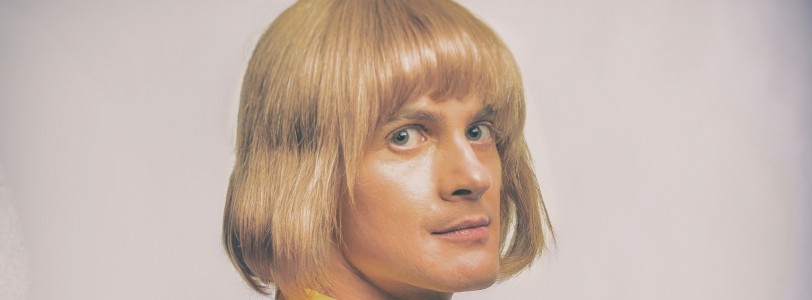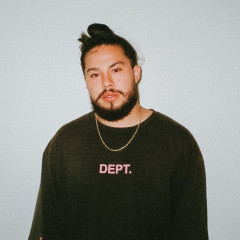Hello! Could you first introduce yourself to the reader?
Hello. Do you mind if I call you "Kitty," like Anne Frank did? Or would you prefer "dear reader," a la Jane Eyre? Whoever you are, I'm Matthew and I am one of those actor-writer-musician-director-dancer-singer-composer-arranger people with too many trades and yet still not enough money to buy nice things. You might have heard of Frisky & Mannish, but you probably don't realise I'm the boy from that, because when I haven't got the eyeliner and skin-tight leggings on, I look completely different!
How would you describe your show?
It is a crazy, fabulous, uplifting, distressing, musical journey through the tortured mind of Richard Carpenter, who is my personal hero. I'm gunning to play him in the Hollywood film of his life, but the tragic thing is, there will probably never be a big-scale Richard biopic. (Even though there have been two Karen ones...) So, I had to make my own! It's got loads of songs, a hilarious frizzy wig and a powerful dramatic arc, just like all the best biopics. But it is also largely fictional and clearly intended as parody, I should make that clear...
Why do you want to perform at Edinburgh Festival Fringe?
I don't. It was a mistake. I thought it said "Edible Fantasy Fridge" and I just really wanted one... No, but seriously, I am trapped in an #edfringe addiction that shows no signs of abating, ever since that clammy summer in 2004 when I and nine other first-years lived four-to-a-room near the Meadows and did a 6pm sketch show that bombed harder than a Messerschmitt. Milton Jones and Joanna Neary were both performing in our venue and I saw their shows multiple times, thinking "Yep, this'll do..."
What differentiates it from other festivals?
Size, obviously. Or "girth," if you will, dear reader... It's very girthy. A lot of girth. Hard to take it all in, if I'm honest. But for all the complaints about there being too many artists jostling for too little audience, I've always found sales actually more reliable in Edinburgh than anywhere else, because people are literally going there for that reason. It's iconic. You can always persuade at least five people to step off the rainy street into a soggy cave if you have a white face and an accordion around your neck - that's not necessarily true of Birmingham or Oxford...
Do you think the Fringe has changed over the years? If so, how? Are these changes positive or negative?
Even though this will be my twelfth Fringe, I really don't feel confident claiming any kind of expertise in that area! I just see people being creative everywhere and feel fuzzy inside. But I don't really think any change is wholly positive or negative - the domination of the Big 4 paid venues led to the creation of various free fringes, just like how the Fringe itself started as a fringe to the main Festival all those years ago. It's fringes on the fringes of Fringes - say Fringe again. Fringe itself is a way of positively actively responding to a perceived negative fact : the impenetrability of a curated "stuffy" festival. So there's always going to be positive reactionary stuff happening as long as there's fringe fringey fringeness.
What first motivated you to enter the industry? Who were your inspirations?
I'm told the first entertainer that caught my eye was Kylie Minogue, but that is odd because I certainly don't consider myself a fan now, much as she's fun and cute. I used to go to a drama club in my local village run by a wonderful woman who had trained as an actress and set up the classes mainly to give her own four children a creative outlet - her name is Anne Berry (now a wildly successful novelist) and she is pretty much responsible for anything I can do onstage. When I was 18, she came to see a school play I was in, and wrote me a card afterwards in which she said, "I knew without a doubt that the fire alarm going off wouldn't phase you. You come on and the audience relaxes." I want that on my tombstone.
If you didn't have your current job, what would you probably be doing?
I really want to be a postman. I'd actually like to do both jobs. Get up in the morning and deliver post, then have down-time, then go to the theatre for an evening show. Bliss.
If you could have any job in the world, what would it be?
I just said! Focus, Kitty, for God's sake...
What is your earliest childhood art memory?
I'm going to interpret "art" in its most general sense, because I've never been a big painting/sculpture fan. I have a very blurry memory of two clowns at a circus, and just feeling very nonplussed about the whole thing - like, why do they look weird? What does it mean? As if there was a reason for everything, and I wasn't getting it. Which incidentally is also why I don't like modern art. I was never very good at just going with the flow - I'd always hesitate, holding back until someone else plunged. So, whenever I see an audience member with folded arms, stony face, unsure, I always think, "It's okay, I'm just a clown at a circus and I need to help them get it." It's quite useful!
Do you ever feel any pressure to be a social commentator, or constantly update material to respond to events?
Not at all. I don't go to the theatre to be commentated at, and I sometimes get turned off when something is so desperately sledgehammering a parallel - 'Trojan Women' set in Iraq or something. I just imagine the director leaning over, patting my hand and saying "This stuff is still happening now. Didn't you know?" Like, yeah, but it's a bit A-level devised coursework, no? That's a terribly cynical thing to say, and I have loved pieces of work that have done it in a genius way, but as a general rule I prefer historical settings. It feels more like escapism. It offers subtler methods of commentary, to my mind.
Equally, do you think there has been a shift in public sentiment that has affected your work?
The growing awareness, in liberal-thinking circles at least, of the need to push for diversity and inclusion is awesome. I don't think it affects my work in terms of content, it just reinforces a healthy perspective about the fact that I am a very privileged white man with plenty, and so if a grant or place goes to a non-white or disabled person, I cannot even imagine feeling legitimately pissed off. And then I look at my own work and think, "Does anyone need to see another comedy show about a straight white man's problems?" And let that awareness filter through my work and improve it. Which is why, in my show, Richard Carpenter is actually portrayed as a black lesbian heroine.
Describe the last year in 5 words or less.
Argh! How. Did. That. Happen?
If you could work with anybody, from any point in history, who would you pick and why?
Cleopatra, 'cos bitch knew her way around a dramatic entrance/exit. Love her.
Richard Carpenter is Close to You is performing at Underbelly, George Square at 17:20 on 2nd – 27th (not 15th). For tickets and more information visit the Ed Fringe website.









0 Comments